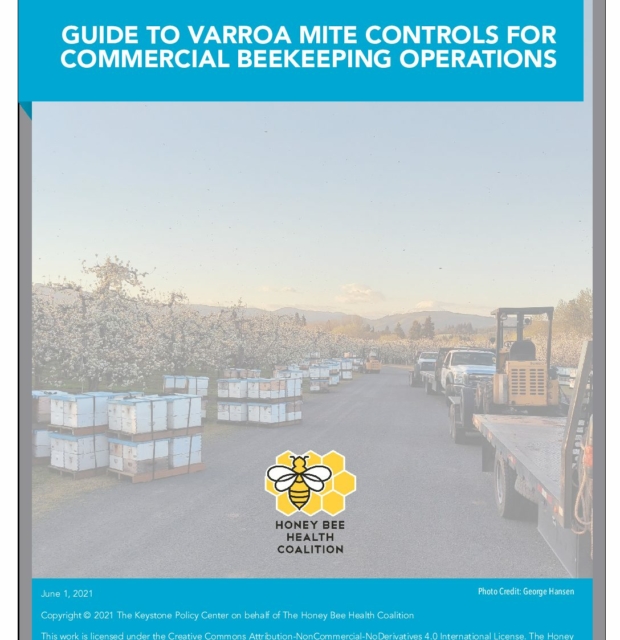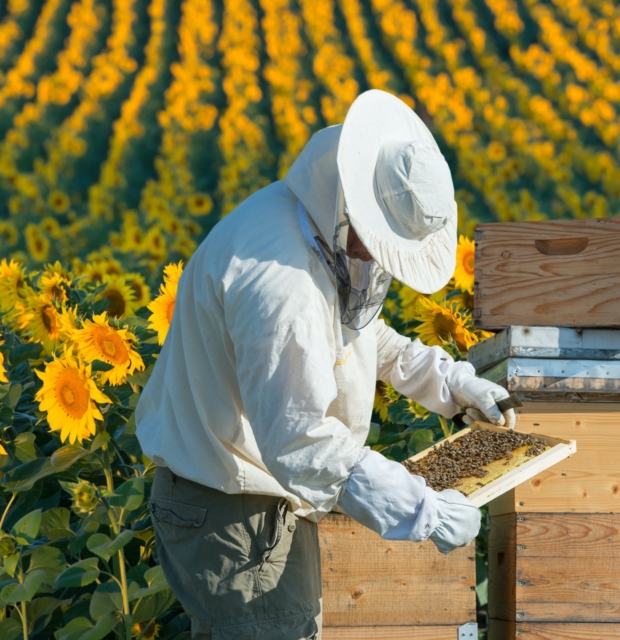News
Coalition Supports Honey Bee Health During Pollinator Week
Supporting honey bee health  has never been as important as it is today. The annual Bee Informed Partnership survey has shown that in 2016, surveyed beekeeper lost a third of their bees. With agriculture dependent on honey bees and other native pollinators, the Honey Bee Health Coalition is proud to be developing collaborative, multi-factor solutions to the challenges bees face.
has never been as important as it is today. The annual Bee Informed Partnership survey has shown that in 2016, surveyed beekeeper lost a third of their bees. With agriculture dependent on honey bees and other native pollinators, the Honey Bee Health Coalition is proud to be developing collaborative, multi-factor solutions to the challenges bees face.
Three years since its launch, the Coalition is still going strong.
With Pollinator Week just around the corner, the Coalition continues to draw inspiration from its namesake and work together to find collective and collaborative strategies to support honey bee health.
Pollinator Week
Honey bees and pollinators work throughout the year to support the food and products we count on every day. Pollinator Week is an opportunity to highlight everything honey bees make possible — including billions of dollars in North American agriculture.
Coalition members are doing their parts to highlight not only the challenges bees face, but also the opportunities for everyday people to support honey bee health. For example, Coalition members will be holding and participating in a series of events, including:
- The St. Louis Zoo will host its 9th Annual Pollinator Dinner on Tuesday, June 20, starting at 6 p.m. CT. The reservation-only event is title “Native Foods, Native Peoples and Native Pollinators” and highlights the culinary and cultural history of Native Americans and the critical supporting role native pollinators play.
- The Levin Family Foundation will celebrate Wright-Patterson Air Force Base being designated as a Bee City USA on Wednesday, June 21, from 10 a.m. to 2 p.m. ET. The Pollinator Expo will highlight local organizations’ efforts to protect pollinators.
- The Kentucky Department of Agriculture will host a Pollinator Stakeholder Day to present the Kentucky Pollinator Protection Plan to Commissioner of Agriculture Ryan Quarles.
- Representatives from the Honey Bee Health Coalition and the Conservation Technology Information Center will discuss the Bee Integrated Demonstration Project in a June 21 webinar from noon to 1 p.m. ET.
But that’s not all: Coalition members and allies are holding a wide variety of events across the nation. To learn more about additional Pollinator Week activities, including those in your backyard, visit the Pollinator Partnership’s interactive map.
 Forage & Nutrition Buzz
Forage & Nutrition Buzz
The Coalition’s Forage and Nutrition Workgroup has been hard at work over the past several months championing honey bee health and supporting collaborative strategies to support pollinators:
- The Coalition unveiled its “Beekeeper Insights on Honey Bee Nutrition Supplements” report in an ABJ Extra article. The article and report highlight the challenges bees face on the forage and nutrition front; explores why, when, and how beekeepers use nutrition supplements; and charts a path forward to enhance the research and resources available to beekeepers.
- Two dozen members of the Coalition recently wrote lawmakers on the U.S. House Committee on Agriculture and the U.S. Senate Committee on Agriculture, Nutrition, & Forestry to urge them to prioritize programs that support honey bee health. The letter highlights the vital role the Farm Bill can plan in helping to “ensure that U.S. agricultural policy supports honey bees — and to ensure that honey bees can continue to support U.S. agriculture.”
- This summer, the Honey Bee Health Coalition will launch a competition to find the most innovative ideas to tackle honey bee nutrition challenges. Anyone with an idea for a creative new solution to advance, disrupt, or pioneer the field of honey bee nutrition will be invited to apply. Finalists will have the opportunity to pitch their ideas to leaders in the beekeeping industry, and a chance to win prize money to implement their projects. Stay tuned for additional information.
Bee Integrated
The Bee Integrated Demonstration Project — an innovative and ground-breaking demonstration project aimed at showcasing and me asuring the real-world impact of a series of best management practices have on honey bees and agriculture — is attracting widespread attention and support. The project will have an overall goal of demonstrating how honey bee health can be improved using a portfolio of tools together in the same agricultural landscape to address several of the major risk factors affecting bee health.
asuring the real-world impact of a series of best management practices have on honey bees and agriculture — is attracting widespread attention and support. The project will have an overall goal of demonstrating how honey bee health can be improved using a portfolio of tools together in the same agricultural landscape to address several of the major risk factors affecting bee health.
Bayer and Project Apis m. recently selected the Bee Integrated Demonstration Project as one of three initiatives they will support through the Healthy Hives 2020.
“This year’s Healthy Hives 2020 grant recipients are undertaking innovative research efforts that have the potential to make an immediate impact on honey bee colony health,” Danielle Downey, executive director of Project Apis m., said in announcing the grant recipients in May. “With these projects, Healthy Hives 2020 has funded 10 honey bee research efforts.”
Healthy Hives 2020 is hosting a Pollinator Week Webinar on Bee Integrated on June 21 from noon to 1 p.m. ET.
The National Honey Board, DuPont Pioneer, the North Dakota Outdoor Heritage Fund, the North Central IPM Center, Syngenta, and the Bee and Butterfly Habitat Fund also have committed financial support to the Bee Integrated Demonstration Project. Conservation Technology Information Center, the Bee Informed Partnership, U.S. Geological Survey, and the North Dakota Department of Agriculture also are partners in implementing the project.
April Coalition Meeting
The Coalition recently hosted a productive meeting at DuPont Pioneer’s offices in Johnston, Iowa. The gathering delved into discussions around seed-coatings, tank mixes, the Farm Bill, and numerous other issues relevant to honey bee health.
Thank you to the Coalition members who attended and contributed to these critical conversations. Thank you, too, to DuPont Pioneer and the Carver Conference Center for hosting our discussions — and showing us your work to support pollinator health.
Bees Matter
Coalition members Bayer, CropLife Canada, the Canola Council of Canada, Monsanto, and Syngenta recently helped launch the Bees Matter program, along with other partners.  This new effort is focused on creating a platform for conversation, dialogue and information sharing regarding modern agriculture and the importance of ensuring a healthy environment for honey bees, which play an important role in Canadian food production and agriculture.
This new effort is focused on creating a platform for conversation, dialogue and information sharing regarding modern agriculture and the importance of ensuring a healthy environment for honey bees, which play an important role in Canadian food production and agriculture.
Bees Matter also is working to equip Canadians with useful information on how they can help support honey bee health. For example, Bees Matter has designated the week of June 5 as National Planting Week and is urging people to plant a pollinator friendly garden.
Learn more by visiting www.beesmatter.ca.

 Varroa mites represents one of the greatest threats to honey bee health, honey production, and pollination services. Every honey bee colony in the continental United States of Canada either has Varroa mites today or will face an infestation.In an effort to track this problem and gather better data, the Bee Informed Partnership, Michigan State University, and the University of Maryland – College Park have launched MiteCheck.
Varroa mites represents one of the greatest threats to honey bee health, honey production, and pollination services. Every honey bee colony in the continental United States of Canada either has Varroa mites today or will face an infestation.In an effort to track this problem and gather better data, the Bee Informed Partnership, Michigan State University, and the University of Maryland – College Park have launched MiteCheck.
The program allows beekeepers to report mite counts and infestations — and to track geographic trends in mite populations.Learn more by visiting https://bip2.beeinformed.org/mitecheck.You also can download the Coalition’s Tools for Varroa Management Guide and related resources by visiting honeybeehealthcoalition.org/varroa/.

